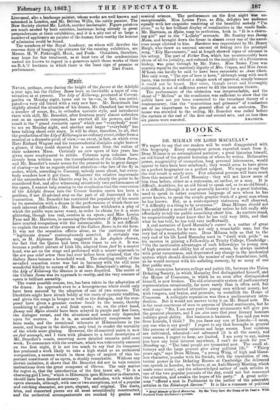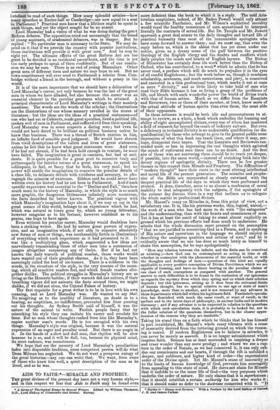BOOKS.
DR. MILMAN ON LORD MACAULA.Y.*
WE regret to say that our readers will be much disappointed with this biography-. Every competent person expected much from it. Dean 'Allman is an accomplished narrator; a great historian himself, an old friend of the greater historian of whom he writes. Delineative power, congeniality of occupation, long personal intercourse, would appear to have been here combined; they would seem to have given us a perfect biographer on a perfect subject. We regret to say that the real result is nearly zero. Few educated persons will learn much from this memoir of Lord Macaulay : they will not know more of hint than before, either as a statesman, an author, or a man. It is difficult, doubtless, for an old friend to speak out, as to an old Mend ; it is difficult (though it is not generally known) for a great historian, used to speak in rather courteous language of men whom he has never known, to speak the simple graphic truth of a great man whom he has known. But, as a contemporary statesman well observed, "A difficulty is a thing to be overcome." Dean Milman should not have published a memoir of Lord Macaulay unless he felt really able effectually to tell the public something about him. As matters stand, he unquestionably must know that he has told very little, and that what he has told, he has told very ineffectually.
A real narrative of Lord Macaulay's career is a matter of great public importance, for he was not only a remarkable man, but the very last of a remarkable race. Dean 3Ailman tells us that to the very end of his life Lord Macaulay used to "dwell with pride" on his success in gaining a Fellowship at Trinity College, Cambridge : "On the inestimable advantages of such fellowships to young men of high promise and ability but of scanty means, he always insisted with great earnestness, and deprecated any change in the academical system which should diminish the number of such foundations, held, as he would recount with his unfailing memory, by so many of our first public men."
The connexion between college and public life, between the Union Debating Society, in which Macaulay first distinguished himself, and the House of Commons, in which he so soon after distinguished himself, is now broken. The old aristocratic system of parliamentary representation occasionally, far more rarely than is often said, but still sometimes selected attractive youne, men without money, but with tongues, and brains, and presence, to embellish the House of Commons. A collegiate reputation was then a parliamentary intro- duction. But it would not answer to try it on Mr. Brand now. He is the most courteous of men to persons of liberal sentiments, but he would say : "Sir, I am sure your literary attainments will give you the greatest pleasure, and I am also sure that your literary honours indicate great ability. But business is business. You said you were from Lincoln, I think ? Do you know any one at Lincoln—I mean, any one who is any good? I regret to say that boroughs in general like persons of advanced opinions and large means. 'Your opinions are cultivated, educated—not advanced (it is all the same) and your means, I regret to hear, are limited. I am sorry to say, Less you have any local interest anywhere, I can't do much for you." Standing up : "The local people are tyrannical now. The small at- torneys and the large grocers give away political life." "Thirty years ago," says Dean Milman, "a young Whig, of high and blame- less character, popular with his friends, with the reputation of ora- torical power in the Debating Rooms at Cambridge (he delivered one speech in London, we believe, at an Anti-Slavery Meeting„ which made some noise), and the acknowledged author of such articles in one of the two popular journals of the day, could not but command the attention, and awaken the hopes of his party." A great noble- man "offered a seat in Parliament to the author of the admirable articles in the Edinburgh Review." It is like a romance of political • Brief Memoir of Lord llacaulay. By the Very Rev. the Dean of St. With Portrait from Rechman's picture.
intellect to read of such things. How many splendid articles—how many speeches at Exeter-hall or Cambridge—are now equal to a seat in Parliament ? Practical men know that a lifetime might be spent in such things, and yet the object sought for be no nearer. Lord Macaulay had a vision of what he was doing during the great .Reform debates. The opposition cried out unceasingly that the breed of young aspirants, of academical debaters, was in danger. But he replied : "No particular man is necessary to the State. We may de- pend on it that if we provide the country with popular institutions, those institutions will provide it with great men.' And he may be right yet. The ultimate effects of the great Reform Act are too great to be decided in an incidental parenthesis, and the time is yet too early perhaps to speak of them confidently. But of one conclu- sion we may be sure. There is an end of young Macaulays. Other great men of different form and nature we may hope to see. But no town constituency will ever send to Parliament a scholar from Cam- bridge without a friend in the borough, and without a penny in the world.
It is of the more importance that we should have a delineation of Lord Macaulay's career, not only because he was the last of the great men to whom we have alluded, but also because this career was an essential element in the peculiar greatness which he attained. A principal characteristic of Lord Macaulay's writings is their masterly manliness. The words are the words of the scholar; the illustrations are the illustrations of one whose memory revelled in the stores of literature: hut the ideas are the ideas of a practical statesman—of one who had sat in Cabinets, made great speeches, lived a political life, spoken evil of men in Parliament, and suffered evil from their speaking. Lord Macaulay was in some respects a daring man; but even he would not have dared to be brilliant on political business unless he knew that business. There was a thread of Scotch caution in him, an infinite fund of sensible good judgment. He would have shrunk from vivid descriptions of the habits and lives of great statesmen, unless be felt that he knew what great statesmen were. And even if he had not shrunk, if he had been bold enough to venture, he must have failed. The imagination is great in essences, but bad at acci- dents. It is quite possible for a great poet to conceive truly and picturesquely the interior nature of a great statesman, to speak his soliloquies, to feel, or fancy that he feels, his very soul ; but no power will enable the imagination to conceive the peculiar details of a class life, to delineate details with vividness and accuracy, to pho- tograph the minutite of existence. Gibbon said he could never have written even his history had he not been in Parliament. And if such specific experience was essential to the "Decline and Fall," then how much more to the history of Macaulay, in which the style is so much more graphic, the dangerous littlenesses infinitely more numerous, the facts described far better known. The practical vigour with which Macaulay's imagination lays about it, if we may so say in the great scenes of this world, belongs to an experience which he had, which was natural in times gone by, which no young littirateur, however sanguine as to his fortune, however confident as to his genius, can hope to have again.
Even without his peculiar career, Macaulay would doubtless have been a striking writer. He had by nature great powers of expres- sion, and an imagination which, if not able to conceive absolutely new forms of men or things, was inexhaustibly fertile in illustrations of everything which such experience as it had presented to it. It was like a multiplying glass, which augmented a few ideas not marvellously transcending those of other men into a succession of images altogether surpassing any of theirs. But if he had not known the daily warmth of political combat, those works would have wanted one of their greatest charms. As it is, they have been sneeringly called the best of ice-houses. There is a coldness in the words, in the structure of the style, in the very essence of the mean- ing, which all sensitive readers feel, and which female readers alto- gether dislike. The political struggles in Macaulay's history are as living as the Homeric battles; if their warmth did not enliven, if their breathing vigour did not animate the facts around them, we might dislike, if we did not shun, the Crystal Palace of history.
The first requisite for a great writer is to be in love with his own meaning, and so Lord Macaulay was. He wanted to say that. No misgiving as to the inutility of literature, no doubt as to a hearing, no scepticism, no indifference, prevented him from pouring out his thoughts. As Sydney Smith said of himself, it was the nature of the animal to write. Foolish people fancy that by mimicking his style they can imitate his career and emulate his fame. But no man whose thoughts rushed from him like Macaulay's, copies another man's words. He is too occupied with his own things. Macaulay's style was original, because it was the natural expression of an eager and peculiar mind. But there is no magic in it. In the hands of a slow and dull man, that rhythm will be slow because he is so, and it will be dull, too, because its physical mind, its mere cadence, was monotonous.
We hope that ere the memory of Lord Macaulay's peculiarities fades into 'disputable tradition, some competent person will do what Dean Milman has neglected. We do not want a pompous eulogy of the great historian—any one can write that. We want, from some of those who knew him well, a quiet description of the man as he lived, and as be was.































 Previous page
Previous page